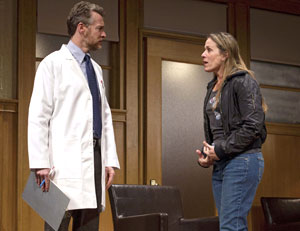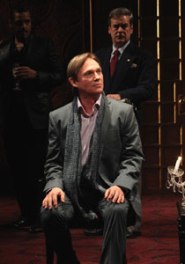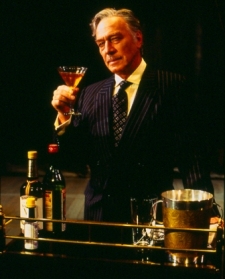Review: Good People
Mar 4th

Playwright David Lindsay-Abaire, who won the Tony and Pulitzer for Rabbit Hole, has expertly tapped into the zeitgeist with his newest work, Good People. This hard-edged comedy about class differences is bound to strike a chord in a modern economic climate that is resulting in an ever growing disparity between the haves and the have-nots.
Set in South Boston, the play primarily concerns the charged interactions between Margie (Oscar winner Frances McDormand), who has just been let go from her job as a cashier in a dollar store, and Mike (Tate Donovan), the old flame turned prosperous physician who she turns to for help.
Single mom Margie has lost her job due to the constant tardiness caused by her having to care for her mentally impaired young daughter. Desperately concerned about her ability to make ends meet, she eagerly grasps at her old friend Jean’s (Becky Ann Baker) suggestion to look up “Dr. Mike” and ask him for a job.
But when she shows up at his well-appointed office, it quickly becomes apparent that Mike, although sympathetic to his old high school flame’s plight, has little interest in helping. He does, however, throw her a bone in the form on an invitation to the birthday party he and his significantly younger, African-American wife Kate (Renee Elise Goldsberry) are throwing for their young daughter.
Shortly before the event, he calls to cancel, explaining that the birthday girl is sick. But Margie, suspecting that he’s merely had second thoughts about inviting her, decides to attend anyway.
When she shows up unexpectedly at his upscale neighborhood home with a gift of a tacky rabbit doll crafted by her eccentric landlady (Estelle Parsons), Margie discovers that he was telling the truth. The resulting confrontation between her and the couple, who are obviously experiencing marital difficulties, sharply exposes the different paths that their lives have taken.
Although not a major work, the play succeeds because of its incisively drawn characters and sharp, witty dialogue. The interactions between the characters feel vividly real, from Mike’s increasing registers of annoyance to Margie’s edgy sarcasm to Kate’s genuine attempts at civility. Even Steve (Patrick Carroll), the dollar shop manager who fires Margie, is revealed to have unexpected depths in the bingo playing scenes that amusingly riff on the lower class characters’ financial desperation.
Under the pitch-perfect direction of Daniel Sullivan, the cast delivers superb performances. It’s no surprise that the ever reliable McDormand is excellent, but here she delivers a multi-faceted portrayal, complete with a perfect Southie accent, that rivals her Oscar winning turn in Fargo. She’s well matched by Donovan, who subtly but expertly conveys Mike’s barely disguised contempt; Goldsberry, suggesting hidden depths in the sympathetic Kate, and the rest of the ensemble.
Adding to the production’s effect are John Lee Beatty’s beautifully crafted sets, which vividly convey the characters’ wildly different financial circumstances.
Samuel J. Friedman Theatre, 261 W. 47th St. 212-239-6200. www.telecharge.com.
Review: Beautiful Burnout
Mar 3rd

If the new theater piece Beautiful Burnout is any indication, the Scottish theater company Frantic Assembly is aptly named. This work by Bryony Lavery (Frozen) set in a boxing gym is a whirlwind-paced portrait of young pugilists training and sparring. Superbly staged and choreographed, it’s fascinating to look at. But it offers little in the way of meaningful drama to complement its striking movement.
A co-production with the National Theatre of Scotland, it’s directed and choreographed by Scott Graham and Steven Hoggett. The latter also served as choreographer for Black Watch, the equally kinetic but far more substantial piece that was presented to great acclaim at St. Ann’s Warehouse a few seasons back.
For this production, the audience sits on three sides of the stage outfitted as a boxing ring. Through a fast-paced series of short scenes and monologues, we are introduced to the characters, including Bobby Burgess (Ewan Stewart), the hard-driving, tough-talking trainer; the three young male hopefuls under his tutelage (Taqi Nazeer, Eddie Kay, Henry Pettigew); the female boxer (Vicki Manderson) who is no less fierce than her male counterparts; and one of the boxer’s mother (Blythe Duff), who offers acerbic commentary throughout.
The sketchy narrative and characters seem mere afterthoughts to the staging, which offers a plethora of intricately choreographed training and fighting sequences, all scored to throbbing techno music by the band Underworld. The sensory assault is further amplified by an array of striking images projected on video monitors.
Although the fierce commitment and physical prowess demonstrated by the performers is highly impressive, it’s not enough to prevent the proceedings from becoming tedious. Beautiful Burnout thankfully avoids most of the clichés endemic to so many boxing dramas, but it also offers little to make us care about its would-be warriors.
St. Ann’s Warehouse, 38 Water St., Brooklyn. 718-254-8779. www.stannswarehouse.org.
Review: Timon of Athens
Mar 2nd

It’s easy to see why the Public Theater has chosen William Shakespeare’s--and possibly Thomas Middleton’s, according to some scholars--Timon of Athens as the inaugural productions of its Public LAB SHAKESPEARE series. This rarely performed drama, one of the lesser entries in the Bard’s canon, has definitely taken on a new resonance in these financially troubled times.
Richard Thomas delivers an impressive performance in the title role of an Athenian nobleman who recklessly showers his friends and associates with money and other forms of largesse. When his financial fortunes change, he’s quickly abandoned by nearly everyone in his orbit. In the second act, he has been reduced to a misanthropic, ranting hermit sequestered in a cave.
Director Barry Edelstein’s decidedly irreverent production delivers an almost satirical take on the play. Set in the vaguely contemporary present with its characters wearing tacky, ‘70s era costumes, it depicts a greedy society whose members are besotted by indulgence and excess.
When Timon hosts a dinner party, his guests are served with a bowl of caviar so huge that it rivals Al Pacino’s gargantuan stash of cocaine in Scarface. As entertainment, he presents a screening of the film It’s a Wonderful Life, reciting one of its most famous lines, “No man is a failure who has friends” before the screen changes to reveal a scene from a vintage stag film. As a visual indicator of the fragile state of Timon’s finances, fallen chandeliers litter the floor. And key emotional moments are signaled by the wailings of an electric guitar.
These gimmicky aspects tend to work against the simple power of the play, which despite its lack of complexity nonetheless exerts a certain fascination. Fortunately, the acting makes up for it. Thomas, an inspired choice, is so inherently likeable a performer that Timon’s frantic eagerness to please seems utterly natural, while his descent into bitter, raging madness is all the more powerful.
He receives excellent support from the leading members of the ensemble, including Mark Nelson as Timon’s loyal steward; Max Casella as a cynical philosopher; and Reg E. Cathey as a rebellious military officer. Unfortunately, many of the smaller supporting roles are played as jokey caricatures that are not nearly as amusing as intended.
Credit must go to the Public for presenting this little seen play, especially considering that tickets can be had for the bargain price of only $15. Better act fast, though—the production runs only through this Sunday.
Public Theater, 425 Lafayette St. 212-967-7555. Through Mar. 6. www.publictheater.org
Review: Barrymore in Toronto
Mar 1st

Lucky Toronto audiences are currently being given the opportunity to witness Christopher Plummer reprising his virtually one-man-show Barrymore, about the famed matinee idol who was as famed for his drinking and debauchery as his stage and film performances. Returning to the role that garnered him a Best Actor Tony Award in 1997, the now 81-year-old performer belies his age—he’s playing Barrymore at age 60, shortly before the end of his life—in a still magnificent star turn that loses none of its impact in the elegant but cavernous Elgin Theatre.
There’s nothing particularly original about William Luce’s slight drama, which utilizes the same biographical formula he employed to greater effect in The Belle of Amherst and with more lackluster results in such later works as Lucifer’s Child (about Isak Dinesen) and Lillian (Lillian Hellman). Set on a mostly bare stage littered with props and costumes, it depicts the dissipated acting legend preparing for a possible stage comeback in one of his greatest successes, Richard III.
Frequently aided by a frustrated offstage prompter, Frank (John Plumpis), the alcohol-ravaged Barrymore tenuously attempts to recite his mostly forgotten lines, frequently dipping into such other Shakespearean roles as Hamlet along the way.
But he mainly regales the audience with a rambling account of his life and career, punctuated by jokey one-liners (“Divorce costs more than marriages, but damn it, they’re worth it!”) and frequent nips from a handy liquor bottle.
Using his glorious voice and still lithe physicality to excellent effect, Plummer well conjures his subject’s charisma and magnetism while also poignantly revealing the vulnerability underlying his comic bravado.
It’s essentially a glorified stand-up routine, but it’s also such a wonderful vehicle that it seems totally understandable that the actor would want to bring it back for his loyal Canadian fans. The production is also scheduled to be filmed for broadcast to movie theaters throughout that country.
Elgin and Winter Garden Theatre Centre, 189 Yonge St., Toronto. 416-872-5555. www.ticketmaster.ca.
Review: Diary of a Madman
Feb 25th

As he’s demonstrated in such films as Shine and the recent Broadway production of Ionesco’s Exit the King, there are few actors as adept at playing crazy characters as Geoffrey Rush. Now starring in the titular role in The Diary of a Madman, the performer delivers an inspired tour-de-force turn that plays like a demented vaudeville act.
Set in 19th century St. Petersburg, the piece depicts the lapse into psychosis of Aksentii Ivanovich Poprishchin, a low-level, pencil-pushing bureaucrat endlessly frustrated by the drudgery of his demeaning job. At night he retreats to the safety of his attic garret, where he pours out his increasingly bizarre fantasies into his journal. In between his exhausting exhortations, he’s attended to by his solicitous Finnish housekeeper (Yael Stone).
Decrying the dictatorial demands of his boss and indulging in his fantasies of an imagined love affair between him and the office director’s beautiful daughter, he regales us with such fantasies as the supposed dialogue between two neighborhood dogs and his dawning realization that he’s actually the king of Spain.
This production, which originated more than two decades ago at Sydney’s Belvoir theater company, is less effective as a dramatization of Gogol’s classic 1835 short story than as a vehicle for its star’s protean talents. Sporting a bizarre tuft of garish red hair and increasingly outlandish costumes, Rush delivers an endlessly physical performance in which his extreme bodily contortions provide a visual correlative to his character’s over-the-top rantings.
While the performance is certainly entertaining, neither it nor the dramatization—by David Holman, director Neil Armfield and Rush himself—ultimately cuts very deep. Although highly effective in conveying the comic extremities of the character’s eccentricities, it is far less so in its attempt to harrowingly depict his full-blown descent into madness.
Adding mightily to the show’s impact are its superb technical elements, including Catherine Martin’s set design with its blood red walls and claustrophobic green ceiling; Mark Shelton’s haunting lighting, which creates shadows that seem to take on a life of their own; and the evocative sound effects and music, created by a pair of musicians located at the side of the stage.
It’s a marvelous showcase, to be sure, for this supremely talented actor, Oscar nominated for his far more down-to-earth performance in the hit film The King’s Speech. But the production’s effects are all on the surface; at the end, we care far too little about this tragic figure, despite the undeniable laughs he’s provided along the way.
BAM Harvey Theater, 651 Fulton St., Brooklyn. 718-636-4100. Through Mar. 12.